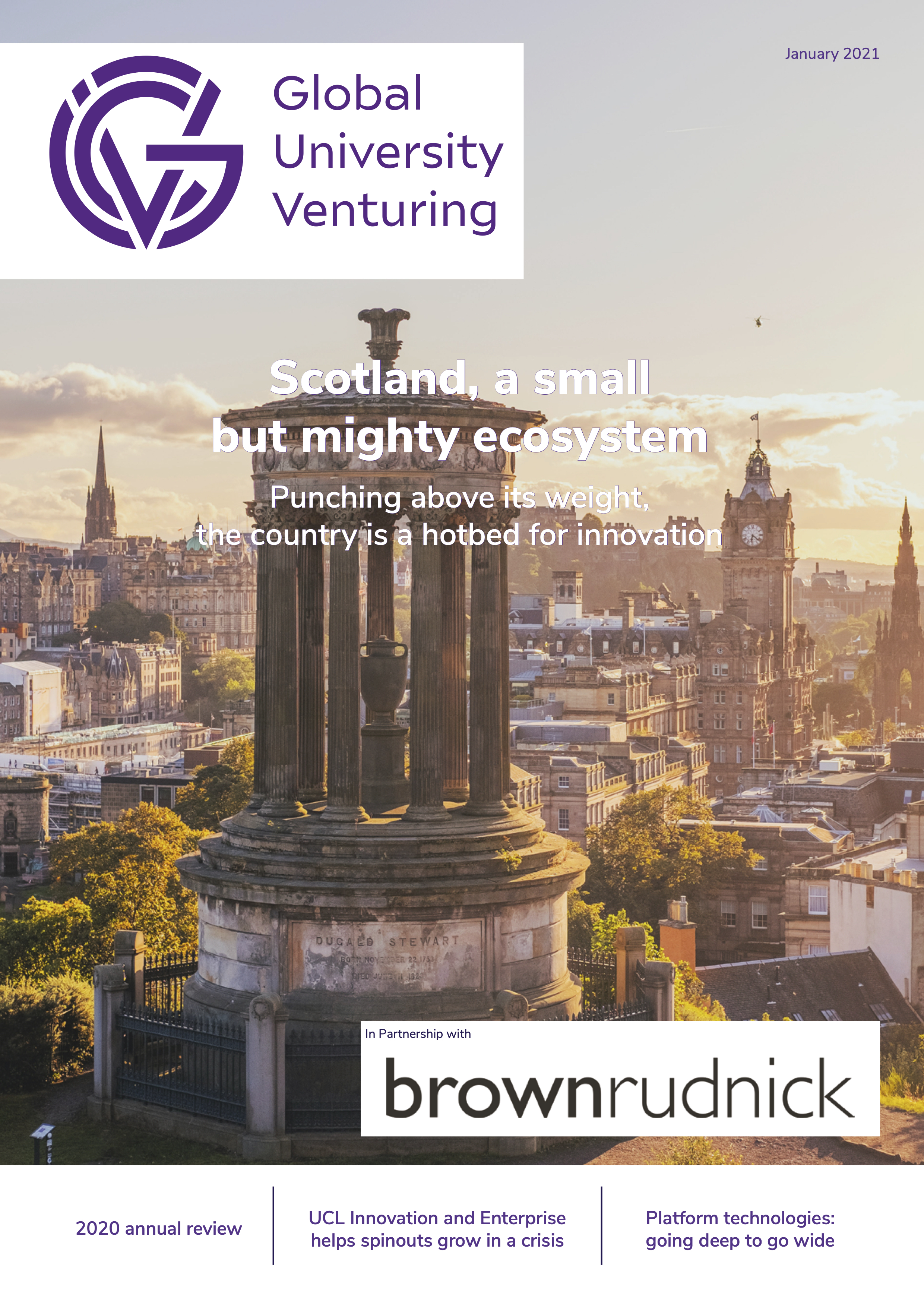When the pandemic hit, University College London stepped up to the challenge of supporting local SMEs.

The UK passed a sad milestone this month when the pandemic’s death toll climbed to 100,000. While the virus does not discriminate, one city that has suffered from particularly high numbers in this peak has been London where one in 30 people have caught covid-19.
Beyond the toll on human life, the crisis has also profoundly impacted businesses everywhere and an institution working hard to support both patients and SMEs through all of this is University College London (UCL).
Martin Davies, director for innovation partnerships within UCL’s Innovation and Enterprise department, shared an example of how the university has been able to help patients: “The Ventura breathing aid was an innovation that was spotted in mid-March by a team involving Prof Rebecca Shipley, who heads up our Institute of Healthcare Engineering, a clinician at University College London Hospitals (UCLH) and some academics in the mechanical engineering department.
UCL’s team partnered the Formula 1 division of carmaker Mercedes to handle the manufacturing of Ventura, which was based on reverse-engineering a known piece of medical equipment and making it suitable for delivering positive pressure of oxygen to patients without the need for intubation.
The innovation went from concept to use in hospitals within about a month, Davies noted. It proved the timeline could be squashed if objectives aligned, a reality he is keen to maintain beyond the imminent threat of the novel coronavirus. These devices are now being used in over 40 NHS hospitals across the country. The designs for these lifesaving breathing aids have also been made freely available through the UCLB E-Lucid express licensing platform and have been downloaded by licensees in over 105 countries around the world.

“For UCL the question is – and this is not my phrase, but I like it: how do we retain that urgency without the emergency? We have a fortnightly dialogue with partners in different sectors to ask a few key questions,” he said. “First, how has covid affected you and your business, and second, what is the challenge over the next six months? How can the university support you to tackle those challenges?
“That has started to tease out some really interesting insights. We have heard from food industry, logistics, the office industry. We are trying not to fall back into the old ways of doing things, where business worked by getting people into the same room.”
Davies and his colleagues are ideally placed to drive such accelerated timelines. UCL Innovation and Enterprise sits in a central position within UCL while also having one foot in the business world to “establish a two-way dialogue between the university and users of our research”.
During the pandemic so far, UCL Innovation and Enterprise has supported some 120 – out of a longer-term target of 360 – local SMEs to deal with the economic fallout. The initiative grew out of an existing programme led by government agency Innovate UK.
Davies explained: “We have a high-growth SME team and have been delivering for some years the Enterprise Europe Network – now called Innovate UK Edge. That initiative is a high-volume way for Innovate UK to engage with the SME community in England, Wales and Northern Ireland.”
The programme is being delivered by some 20 organisations, some of which are universities such as UCL, but also enterprise agencies, chambers of commerce and other innovation operators. The different members of the consortium collaborate and share best practices, though Davies stressed that different regions would have different needs.
“UCL is leading on the more R&D-driven SMEs and services around that,” he said, adding that “looking at international markets is also a core strength for us.”
One example of the latter is Gommyr, Davies remarked. The company is involved in microgrid energy distribution, trading and sharing, and UCL helped take that technology to a partner in the Democratic Republic of Congo.
The nation might not be an obvious choice but, Davies underlined, “it is developing countries where local grids are a solution for energy distribution and access because they do not tend to have national grids.”
SMEs come to UCL Innovation and Enterprise through one of three routes, Davies said. First, businesses that have already secured another Innovate UK grant and are then referred to UCL to accelerate their growth. A second feed comes through intermediate partners such as national accelerator Catapult Network. The third pipeline is UCL’s own spinouts and startups.
The aim with each company, Davies declared, is to build a long-term partnership with the company although there is no such stipulation and if a business wants to access UCL’s services and move on it is free to do so.
Kalgera banks on financial inclusion
One company that has accessed the help of Davies and his colleagues and “very firmly” plans on maintaining that relationship is Kalgera, the developer of a platform to protect vulnerable people from financial exploitation. Dr Dexter Penn, founder of Kalgera, detailed the origins of his company: “I am a medical doctor and I work at the UCL Dementia Research Centre. A few years ago, I noticed that, recurrently, many patients were being deprived of their hard-earned savings.
“I created Kalgera initially as an app to alert family members to fraud. Since launching in early 2020, we have been featured in a number of publications such as the Financial Times, Forbes and Wired UK, and we were on the FintechCity’s Hot Ten list. It has been a bit of a whirlwind.”
While initially setting out to focus on protecting vulnerable people as individuals, the company quickly “realised that we needed to go further, and we have moved onto another product that is helping institutions to interpret the financial behaviours of their customers to better protect them from abuse.”
Kalgera has been working with UK regulator, the Financial Conduct Authority (FCA), on its Digital Sandbox Pilot which provides access to seven million synthetic data records to develop the platform.
It is not the only high-profile collaboration that Penn has managed to strike: he revealed to GUV that he had spent lockdown in Cheltenham to participate in the National Cyber Security Centre (NCSC)’s accelerator run by Wayra. NCSC is a part of the UK’s intelligence agency GCHQ and Kalgera’s participation in the programme had, fittingly, been kept under wraps until now.
But arguably even more impressive is that Penn has worked with the UK government directly, spending time at 10 Downing Street contributing to public policy around financial inclusion with the cabinet office. That experience, he said, was “very exciting but slightly frustrating, because public policy changes take so long. And I did not realise it at the time, but I was actually a campaigner for vulnerable people.”
He continued: “I have also been a member of the All-Party Parliamentary Group for Longevity that was given the task of coming up with recommendations for strategies to help people have an additional five years of quality life – not just at the end of your life, but your total life.
“Being exposed to people that, in their varying areas and jobs, were aligned around this goal was inspiring. It made me realise that what I am doing is important not just for my company but for all of society.”

That burden is not one that will have to be carried by Kalgera alone, of course, and Penn noted that regulations are incoming that will require banks to identify vulnerable people – and have a means for customers to identify themselves as such – and prioritise them in the system.
Becoming vulnerable can happen to anyone and Penn revealed that FCA research had found as many as 24 million citizens were potentially at risk – nearly half of all UK adults. The issue has become more acute with the pandemic and, Penn added, “I am really proud to have been part of the group that has generated with some of these recommendations.”
The benefits go beyond preventing personal financial losses, too. It also means reducing the mis-selling of products to people and suggesting appropriate services that will help customers, “which is what financial inclusion is,” Penn declared.
It is a burden that Kalgera will have to carry perhaps more now than a year ago, however. “Some competitors have gone or changed,” Penn noted. Kalgera itself shifted from offering services to individuals to becoming a business-to-business operation.
The support from UCL in that change “has been really helpful,” Penn underlined. The choice was an easy one: besides Penn working at UCL and its teaching hospital, several of the team are UCL alumni and the company is a member of the university’s incubator the Hatchery. Penn joked that “it is a bit like Hotel California: ‘you can check out but you can never leave’.”
And as challenging as the past year has been, Penn sounded upbeat about the future. “There were good things that we did in 2020: we got our first product out there, we had a really positive reception, worked with the regulator and signed our first contract with a UK institution,” he said. “It was not all doom and gloom, but we are very much looking forward to scale with the help from NCSC.”
Also helping Kalgera accelerate its growth in 2021 will be its stakeholder working group, which the company convened with experts in fraud, as well as experts in accessibility and disability. “Another of our advisors is Graeme Whippy, who received an MBE for his work in the area,” Penn added, “and carers, one of them from the UCL Rare Dementia Support peer support group for people living with dementia and working in development.”
The group, he explained, has “developed a framework for financial abuse – what does it look like based on real cases of these experts and the lived experience of carers? From that, we developed a risk matrix that has different scenarios, levels of severity and potential mitigations.
“That fed directly into our algorithm development. It is really important from an ethical point of view that we are considering all of the various factors and legislation so that we are not inadvertently introducing harm as opposed to preventing it.”
The group is open to new members, Penn noted, and interested parties are free to contact the company. And Kalgera, which has so far kept afloat with a few hundred thousand pounds worth of investments, grants and competition prizes, is also looking to grow with venture capital: the company will open its seed round in 2021, led by Deepbridge Capital, and Penn made sure to mention that any interested investors can contact himself, Wayra or UCL to see the pitch deck.
Oslr gathers students around the hospital bed
Another company that has benefited from UCL and the Hatchey is Oslr, which has built a platform that helps teaching doctors to schedule hospital bedside training for students. The company is named after Sir William Osler, a physician in 19th century and a pioneer in making sure that medical students move from the classroom to hospital wards.
“Two co-founding doctors had similar frustrations as students and as doctors trying to get this real-life interaction with patients,” Alan Pooley, chief operating officer of Oslr, said. “You can get a pizza, a taxi or even a date with your phone, but you cannot get students around the hospital bed to teach.”
The company joined the UCL Hatchery in 2018 after chief executive Dr Adam Pennycuick heard about the incubator programme. Pennycuick, a clinical research fellow and respiratory doctor at UCLH, applied and that was when the business started taking off, Pooley said. Up until that point, everyone on the team worked part-time alongside their day jobs. The Hatchery helped Oslr secure an Innovate UK grant, and from there the company started building a team and signed an agreement with online courses provider BMJ Learning.
And while Oslr has recently left the Hatchery – its maximum residency is two years – Pooley and his team remain closely involved through digital channels and now offer their expertise to new participants.
Oslr has also benefited from the Hatchery’s mentor programme and has been able to tap the expertise of a UCL Innovation and Enterprise mentor, Adam Field, product manager at Forward Partners and former product manager at telehealth platform Babylon Health, around company messaging, the pitch deck and general pointers on how to run a health tech startup.
“We want to be making sure that at the end of the day, there is a public benefit and that is very important for our company.”
It helps that the company is on the cusp of generating recurring revenue. “We are talking to some organisations about how they might want to pay for elements of our product,” Pooley explained.
That Oslr is now looking to bring in hard cash from clients was not always a given. In fact, early on in the pandemic it was considering halting operations and furloughing staff because the covid outbreak meant all hospital training was put on hold.
“We were very much questioning what to do next,” Pooley remembered. “We made a couple of changes to our product so you could arrange online training. Then we saw Innovate UK offering funding for solving covid-related challenges and we looked at how we could adapt our platform – ideas ranged from repurposing it to train NHS volunteers to grocery delivery drivers.”

Grocery deliveries sound like an odd choice, but actually UCL was already working with its local borough of Camden on the best ways of delivering food parcels to people who were shielding, Davies said.
It was not what Oslr ended up doing, however. “What we fell upon was social care,” Pooley said. “That is a big sector: there are more social care beds than hospital beds. The scale of that challenge just struck us as enormous.”
It was a challenge close to home: Pennycuick’s wife, Mary, is a social worker and, Pooley continued, “she pointed out some of the challenges they faced in having training experiences. It seemed very close to what we were doing, but not the same – a complimentary sector. People are using WhatsApp and email to send our rotas to arrange training – and none of these platforms are dedicated to health or care training, which is an inherent problem and typically cancellation rates are high.”
The pivot meant not only did Oslr not furlough anyone, it kept a contractor employed and even hired additional members of staff. That success, Pooley acknowledged, “was very much with the help of UCL Innovation and Enterprise” which helped refine the bid for Innovate UK funding.
The pivot taught Oslr that “wherever you need a central training platform, our product can be a white label – particularly in the medical and care industries,” Pooley commented. And while the company was busy adapting its offering to social care, hospitals restarted student training as they learned to keep regular patients safe from covid-19 sufferers.
“We are definitely going to carry on with both platforms because everyone we spoke to said the same thing: using media that is not dedicated to your sector, particularly in training, is problematic.”
He added: “Typically, a quarter of sessions fall through because of the teacher, the student or the patient, but if you are using a dedicated platform it keeps everyone focused.”
There is another advantage to Oslr’s platform, he said: “it also records the doctor’s continuing professional development automatically. We are focusing on these two sectors at the moment and for our small enterprise that is enough, but we would be interested to expand longer-term into other sectors.”
When the time comes, Pooley may very well turn to UCL for help once more. He said: “I definitely want to keep in touch with what is going on at the Hatchery. And it is not just about what we take from that, it is what we can contribute too.”
What matters to London matters to UCL
The impact UCL was able to make through its partnerships with Oslr and Kalgera are precisely the types of takeaways that Davies hopes to generate: “We hope that whoever we work with in our programmes is going to get a good impression of working with UCL and of working with a university, because that can be a challenge for small businesses.
“We want them to come back or tell their friends, and we hope they might have a good impression of our graduates, which feeds into supporting graduate employability as well. There is a number of virtuous circles here that we are hoping to establish or enhance.”
The pandemic has even grown the range of potential partners that are approaching Davies’ team now. And that is clearly a good thing, particularly as Davies points at the Scaleup Index 2020 report from data analytics firm Beauhurst that shows scale-up companies won about £286m of Innovate UK grant funding which then leveraged another £5bn in private sector investment.
“That crowding-in effect is really powerful,” Davies remarked. “It is a very important thing that is happening in the UK right now, it is almost a 20:1 return. If you consider how we are going to reflate the economy, small businesses are absolutely going to be a part of that.
“Supporting SMEs to work with a whole range of organisations, including universities, is good government policy because that crowding-in of investment shows it is not just about an initial grant. It is a long-term trajectory.”
And while the pandemic will end at some point, there is another danger hanging over the UK economy: its departure from the EU that concluded on December 31. But Davies is optimistic that, at least locally, everything will be fine.
“London is going to be cushioned to an extent from what changes might happen in terms of businesses deciding to move or shutting shop altogether,” he said. “London is a financial centre and has a growing tech sector so there is some resilience. The companies that approach us have obviously already made the decision to be more involved in R&D and think internationally, so they will probably be okay.
“That does not mean there are not some that will not be, but universities are a key player in helping the country move forward in reflating the economy and coming up with new avenues for business creation.”
He concluded: “UCL sees itself as part of the bricks and mortar of this place: what matters to London matters to us and that includes helping the economy and helping SMEs grow.”
There can be no doubt that these are not just words: any SME seeking the assistance of UCL Innovation and Enterprise will count itself lucky.

Thierry Heles
Thierry Heles is editor-at-large of Global University Venturing and Global Corporate Venturing, and host of the Beyond the Breakthrough podcast.









